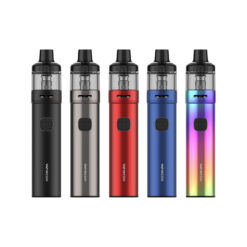In recent years, vaping has gained significant popularity as an alternative to traditional smoking. Simultaneously, the fitness industry has experienced a surge in interest and participation, with individuals striving to achieve their health and wellness goals. While these two trends may seem unrelated, an intriguing question arises: Can e-cigarettes, commonly used for vaping, actually help individuals stick to their workout routines and enhance their fitness journey?
The potential correlation between vaping and exercise has piqued the curiosity of both vaping and fitness enthusiasts alike. Advocates argue that vaping may offer benefits such as increased endurance, improved recovery, and motivation, which could positively impact workout performance and adherence.
Exploring The Intersection Of Vaping And Fitness
The intersection of vaping and fitness presents a fascinating area of inquiry, as it examines the potential relationship between two seemingly disparate realms: electronic cigarettes and physical fitness. While vaping is primarily associated with nicotine consumption and smoking cessation, its impact on fitness and athletic performance has become a subject of interest for many individuals engaged in regular exercise routines.
-
UWELL Caliburn X Pod System
R625.00 -
Uwell Caliburn A3 Pod Kit
R450.00 -
Vaporesso GTX GO 40 Kit
R395.00 -
Vaporesso Zero S Kit
R420.00
Proponents argue that vaping can enhance aspects of fitness by offering potential benefits such as increased endurance, improved recovery, and heightened motivation. It is suggested that the stimulant effects of nicotine found in e-cigarettes can provide an energy boost, potentially enabling individuals to push through intense workouts or train for longer periods. Additionally, some claim that vaping may aid in post-workout recovery by reducing inflammation and promoting muscle repair.
Sceptics express concerns about the potential health risks associated with vaping and question its compatibility with a healthy lifestyle. They argue that the long-term effects of vaping on lung health and overall well-being are still not fully understood.
The Impact Of Vaping On Athletic Performance
Athletic performance is a multifaceted concept that encompasses various factors, including physical fitness, endurance, and overall well-being.
One aspect often discussed in relation to vaping and athletic performance is endurance. The stimulant properties of nicotine found in e-cigarettes can provide an energy boost, potentially improving endurance during workouts or athletic activities. Nicotine may also increase heart rate and enhance oxygen utilisation, allowing individuals to sustain higher levels of exertion for extended periods.
However, it is important to approach these claims with caution. While nicotine may temporarily increase alertness and focus, its impact on actual physical performance is still a matter of debate. Research on the direct effects of vaping on athletic performance is limited and inconclusive, with mixed findings regarding its potential benefits.
Another factor to consider is the potential influence of vaping on post-workout recovery. Proponents argue that vaping may aid in recovery by reducing inflammation and promoting muscle repair. They suggest that certain compounds found in e-cigarette aerosol, such as antioxidants, could have anti-inflammatory properties that facilitate the body’s recovery process. However, the precise effects of these compounds on recovery and muscle repair are not well understood, and further research is needed to establish any potential benefits.
Vaping And Endurance: Workout Recovery
Endurance plays a crucial role in various athletic activities, from running marathons to engaging in high-intensity interval training. Nicotine, as a stimulant, can increase heart rate and stimulate the release of adrenaline, potentially leading to improved endurance during workouts.
Nicotine’s potential impact on focus and mental alertness is often cited as a potential benefit for endurance activities. Advocates suggest that the cognitive effects of nicotine can enhance concentration and mental stamina, allowing athletes to stay motivated and focused during prolonged workouts or competitions.
When it comes to post-workout recovery, certain compounds present in e-cigarette aerosol, such as antioxidants, may have a positive impact. Antioxidants are known for their ability to combat oxidative stress, reduce inflammation, and aid in muscle repair. Some argue that these antioxidant properties could contribute to a faster recovery process after intense exercise sessions.
However, while nicotine may provide temporary benefits in terms of energy and mental focus, its long-term impact on physical performance and overall health remains a subject of ongoing study. Nicotine can constrict blood vessels and potentially reduce oxygen flow to muscles, which may have a negative impact on endurance. The long-term effects of vaping on recovery processes and muscle repair are not yet fully understood, and more research is needed to draw definitive conclusions.
Vaping And Motivation: Can Vaping Help You Stay Committed To Your Fitness Goals?
Motivation is a crucial factor in maintaining a consistent and dedicated approach to fitness goals. Vaping enthusiasts often describe the act of vaping as a sensory experience that can be enjoyable and satisfying. The availability of different flavours and the physical sensation of inhaling and exhaling vapour can provide a sense of pleasure and relaxation.
Some individuals find that incorporating vaping into their fitness routine helps them establish a positive association between exercise and the enjoyment derived from vaping. This positive reinforcement may contribute to increased motivation to engage in physical activity consistently.
Additionally, vaping can serve as a form of distraction or stress relief. Exercise can sometimes be physically demanding and mentally challenging, especially when facing fatigue or pushing through intense workouts. Vaping, with its potential calming and relaxing effects, may help individuals manage stress and alleviate the mental strain associated with exercise.
Ultimately, the relationship between vaping and motivation is complex and highly individualised. It is crucial for individuals to assess their own needs, preferences, and the potential risks involved. Consulting with healthcare professionals, fitness experts, and mental health practitioners can provide valuable guidance in developing a personalised approach to motivation that aligns with long-term health and fitness goals.
Balancing The Pros And Cons Of Vaping In Your Fitness Journey
When considering the role of vaping in your fitness journey, it is crucial to weigh the potential pros and cons associated with this practice. Understanding the advantages and disadvantages can help you make informed decisions that align with your health and fitness goals.
Pros Of Vaping In Your Fitness Journey
- Smoking cessation aid: For individuals transitioning from traditional smoking to vaping, e-cigarettes can serve as a harm reduction tool. Vaping eliminates exposure to harmful combustion byproducts found in cigarettes, which can positively impact overall health and lung function
- Motivational aid: Some individuals find that incorporating vaping into their fitness routine can provide a sense of enjoyment and relaxation, enhancing motivation to engage in physical activity. The ritualistic nature of vaping, coupled with flavours and sensory experiences, can create positive associations with exercise
- Social support: Vaping communities and support groups can provide a sense of camaraderie and social support during your fitness journey. Engaging with like-minded individuals who share similar interests can offer encouragement and accountability
Cons Of Vaping In Your Fitness Journey
- Potential health risks: While vaping is often considered a safer alternative to traditional smoking, its long-term health effects are still not fully understood
- Nicotine addiction: Many e-cigarettes contain nicotine, which is highly addictive. Dependence on nicotine can hinder intrinsic motivation and self-discipline, potentially creating a reliance on vaping for performance or motivation
- Interference with fitness goals: Nicotine has the potential to constrict blood vessels and potentially reduce oxygen flow to muscles, which may counteract desired outcomes
In considering the pros and cons of vaping and exercise, it becomes evident that striking a balance is key. Consulting with healthcare professionals, fitness experts, and mental health practitioners is crucial in navigating the complexities of vaping and its potential impact on fitness. Their expertise can provide personalised guidance and assist in developing comprehensive plans that prioritise health, fitness goals, and long-term well-being. Be sure to check out Vaperite to stay updated on the latest vaping news.










